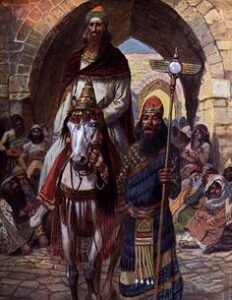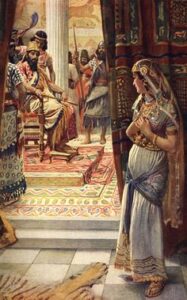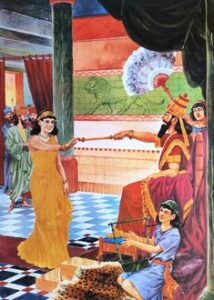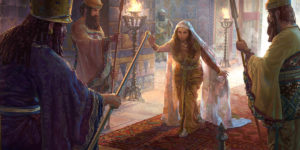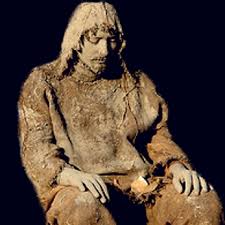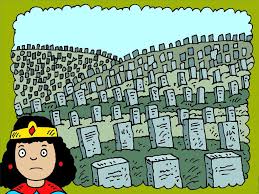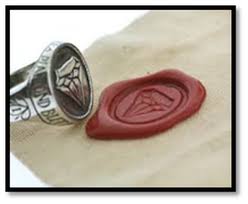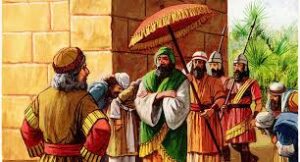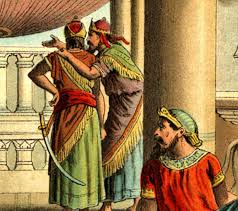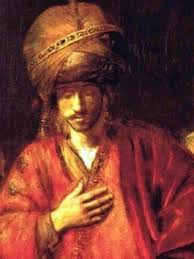Bf – So They Impaled Haman on the Pole He Had Set Up for Mordecai 7: 1-10
So They Impaled Haman on the Pole
He Had Set Up for Mordecai
7: 1-10
So they impaled Haman on the pole he had set up for Mordecai DIG: The king asked again, implies a previous inquiry. When? Why? What has led up to this dramatic banquet? What does it reveal about Esther’s character? What does it reveal about Haman’s character? While this chapter ends with Haman’s death, what issues remain unresolved?
REFLECT: If you were Esther, would you have handled the situation differently? How so? When have you “stepped out in faith,” as she did? What was at stake? What “enemy” threatens you at this time? What lesson does Haman teach you?
So the next day King Ahasuerus and Haman went to Queen Esther’s banquet (7:1). They both had no idea what awaited them there. This is the fifth banquet mentioned in Esther (see chart below). And as they were drinking wine at the end of the meal on the second day, the king repeated his invitation to Esther, but this time using her royal title: Queen Esther, what is your petition? It will be given you. What is your request? Even up to half the kingdom, it will be granted (7:2). Once again, this saying was not to be taken literally, but meant that the king would look favorably upon her request. This was an encouraging sign for the queen.
The literary structure of the book is highlighted by the repetition of a feast or banquet. Esther starts and finishes with a pair of banquets, with other pairs in between as revealed in the diagram below:
A1 Ahasuerus’ banquet for the nobles of the empire (1:2-4)
B1 Ahasuerus’ banquet for all the men in Susa (1:5-8)
C1 Esther’s coronation banquet (2:18)
D1 Esther’s first banquet for the king and Haman (5:1-8)
D2 Esther’s second banquet for the king and Haman (7:1-9)
C2 Feasting in celebration of Mordecai’s promotion (8:17)
B2 The first day of Purim feasting throughout empire (9:17 and 19)
A2 The second day of Purim feasting in Susa (9:18)
Esther now begins the delicate and dangerous task of accusing Haman without incriminating the king who had, after all, sealed Haman’s decree of death with his full knowledge and approval. She has to provoke Ahasuerus against his friend and closest advisor without bringing the king’s wrath down upon herself.79 This was no easy task.
Then Queen Esther answered, “If I have found favor with you, Your Majesty, and if it pleases you, grant me my life – this is my petition. In the Hebrew there are only four words; but they are words that have a specially poignant appeal to the Jew who understands the interdependence of the fate of the individual Jew is bound up in the fate of the Jewish people. And spare my people – this is my request (7:3). The brief statement was full of pent-up emotion. She was saying that her life and the life of her people were inseparable. Her destiny was tied to theirs. As soon as Esther identified herself as a Jewess, she became a target of Haman’s holocaust.
Esther continued her brief but masterful reply to the king: For I and my people have been sold to be destroyed (3:9), killed and annihilated. Esther quotes the precise words of Haman’s decree (3:13), but using the Hebrew passive voice,80 she delayed any reference to the prime minister or the fact that it was the king himself who sold the Jews for ten thousand talents of silver (3:9 and 11).
Without waiting for the king to speak, she added: If we had merely been sold as male and female slaves, I would have kept quiet, because no such distress would justify disturbing the king (7:4). She not only shows the unbelievable power of the king, but also the condition to which she was reduced. Esther may have been apprehensive, not knowing if the king would grant her request. When she said: my people, she put herself in a dangerous position. It was quite possible that King Ahasuerus would fly into a rage, as he had done with Vashti (1:12).81 Or possibly Haman might have had more influence than she suspected.
But the king did not become angry at first; instead he requested more information about who had done such a thing to Esther and her people. Her indirect tactic was similar to that used by the prophet Nathan when confronting David and his sin with Bathsheba (Second Samuel 12). Nathan defused David’s defense when he first aroused his indignation and his resolve to see justice done before revealing that it was David himself who was the guilty party. The same strategy worked for Esther, and the king’s indignation and anger exploded with the demand that she tell him, “Who is he? Where is he – the man who has dared to do such a thing” (7:5)? The emotion and anger is lost in the English translation, but the Hebrew words are spoken in rapid fire. Evidently Haman’s death edict had made so little impression on King Ahasuerus that Haman didn’t even remember Esther’s quotation of it.

Esther’s response was short and to the point: An adversary and enemy! Up to this point she had been careful to avoid any reference to the prime minister, but almost shouting, she then blurted out: This vile Haman! (7:6a). By informing King Ahasuerus that Haman was the guilty party she had revealed the fact that she was a Jew. This must have been a real surprise for the king also, because he had not known her nationality.
Then Haman was terrified before the king and queen (7:6b). The fact that the queen was a Jew was also news to Haman. Instantly he must have realized that he had not only condemned all the Jews in Persia, but that one of them was the king’s favorite wife!
Now the king was furious. He got up in a rage, abruptly left his wine and went out into the palace garden (7:7a). Haman had seen the king’s wrath and he knew what it meant. Ahasuerus might have been manipulated in some of his personal relationships, but he was no fool politically. What had he done! He felt trapped by his own words. How could he punish Haman for a plot he himself had approved? If he did a mea culpa he would lose face in the eyes of his subjects. But more importantly, he had issued an irrevocable law. How could it be canceled? Strangely enough, the wicked Haman would soon resolve this problem all by himself.
But Haman, realizing that the king had already decided his fate, stayed behind to beg Queen Esther for his life (7:7b). For the fourth and last time in the book of Esther, God’s name is hidden (see 1:20, 5:4 and 5:13). Here, within the phrase that his fate had been decided, the name of YHWH (see my commentary on Exodus, to see link click At – I AM Has Sent Me to You) is once again hidden. It is formed by the final letters of four successive Hebrew words when read forwards: kY kltH ‘lyW hr’H.82
How ironic that Haman, who had demanded that Mordecai bow before him was then prostrate at the feet of the Jewish Queen Esther. She was his only hope. Harem protocol, however, dictated that no one but the king could be left alone with a woman of the harem. Haman should have left Esther’s presence immediately when Ahasuerus retreated into the garden, but where could he go? His choice was either to follow the king, who had bolted in anger from his presence, or to flee the room, suggesting guilt and inviting pursuit. Haman was trapped – it was checkmate.83

They were probably not alone in the room; nevertheless, even in the presence of others a man was not to approach a woman of the king’s harem within seven steps. Haman’s timing could not have been worse. Just as the king returned from the palace garden to the banquet hall, Haman was falling on the couch where Esther was reclining. The arrogant bully became, as common in the face of disaster, a whining coward. That Haman would actually be on the same couch where the queen was reclining was unimaginable. The king’s dilemma about what to do with Haman was settled. He exclaimed, “Will he even molest the queen while she is with me in the house” (7:8a)? In his blind rage, the king completely misinterpreted Haman’s posture as a sexual advance. No matter what Haman’s intentions were, he had broken harem protocol and that alone was reason to condemn him to death. The rabbis teach that Haman’s behavior was so unthinkable that he fell on the queen’s couch only after the angel Gabriel gave him a hard shove, ensuring his fate.84 It was Haman’s last, desperate, fatal action.
The nature of the three central characters is brought to light in this verse. Haman was a prideful man who was a coward at heart. The king was easily influenced and weak in spite of his appearance of power, and Esther was courageous and steadfast. She was not hard and calloused because she would not listen to Haman’s pleas. She could not have helped even if she had wanted to do so. It was completely out of her hands.85 As soon as the word left the king’s mouth, they covered Haman’s face before leading him away to be executed (7:8b). He was doomed to death.
This very moment Esther demonstrated great strength of character and fulfilled her highest calling. She comes into her own only after she made the conscious decision to align herself with God’s covenant people. Esther wasn’t a trophy wife, or an ornament, a queen in name only, but became a leading participant in the will of God. She was created for this. This was her calling as a woman – to wage war against the enemies of God and fight for His kingdom and His people. She did what King Saul could not, or would not, do. Queen Esther killed Haman with her cunning, as surely as King Saul could have, indeed should have, killed Agag with the sword.
Then Harbona, one of the eunuchs attending the king (1:10), said: A pole reaching to a height of seventy five feet stands by Haman’s house. He had it set up for Mordecai, who spoke up to help the king (7:9a). Possibly Haman was hated by many people in the palace and in the city of Susa. It seems that there were those who wouldn’t lose any sleep over Haman being killed, Harbona being one of them. He obviously knew of Haman’s plot to kill Mordecai. When he suggested that Haman be impaled on the very pole that he had prepared for Mordecai, the Mordecai who, incidentally, had saved the king from assassination, the idea was good enough for Ahasuerus.
 The king said: Impale him on it (7:9b)! Accordingly, in the end, God brought justice. So they impaled Haman on the pole he had set up for Mordecai. Rather than being hanged by the neck on a modern-type gallows, people were impaled with nails on a wooden pole in public view, as lesson to the populace. His fall from grace was sudden. One day he was on top of the world, with all the wealth and power of the mighty Persian Empire, and the next day, he was executed in disgrace. He never saw it coming.
The king said: Impale him on it (7:9b)! Accordingly, in the end, God brought justice. So they impaled Haman on the pole he had set up for Mordecai. Rather than being hanged by the neck on a modern-type gallows, people were impaled with nails on a wooden pole in public view, as lesson to the populace. His fall from grace was sudden. One day he was on top of the world, with all the wealth and power of the mighty Persian Empire, and the next day, he was executed in disgrace. He never saw it coming.
Dear Powerful Heavenly Father, Only two choices. So important to decide now to love the one who can offer eternal life and joy to all who follow him. So also Messiah, was offered once to bear the sins of many. He will appear a second time, apart from sin, to those eagerly awaiting Him for salvation (Hebrews 9:28). Only those who love Him will be saved and go to heaven with Him. “Knowing about” Yeshua Messiah is not good enough. To enter heaven, one must have a covenant relationship of love for God. Loving Him and making honoring Him as your top priority in life, is what makes you God’s child (John 1:12). God opens the door for all His children to come and live with Him in heaven (John 14:11-3).
God offers a loving covenant relationship for all no matter their: color of skin, their finances, or their age. It is for all who choose to love and to follow God as their Lord and Savior. For if you confess with your mouth that Yeshua is Lord, and believe in your heart that God raised Him from the dead, you will be saved. For with the heart it is believed for righteousness, and with the mouth it is confessed for salvation. For the Scripture says, “Whoever trusts in Him will not be put to shame.” For there is no distinction between Jew and Greek, for the same Lord is Lord of all—richly generous to all who call on Him. For “Everyone who calls upon the name of Adonai shall be saved” (Romans 10:9-13).
Death brings finality to what has been chosen and there is no way to undo that choice. And just as it is appointed for men to die once, and after this judgment (Hebrews 9:27). When Messiah returns, He will not come as a baby; but he will come to rapture his bride to heaven. For this we tell you, by the word of the Lord, that we who are alive and remain until the coming of the Lord shall in no way precede those who are asleep. For the Lord Himself shall come down from heaven with a commanding shout, with the voice of the archangel and with the blast of God’s shofar, and the dead in Messiah shall rise first. Then we who are alive, who are left behind, will be caught up together with them in the clouds, to meet the Lord in the air – and so we shall always be with the Lord (First Thessalonians 4:15-17).
May we fix our eyes on our eternal home and not worry when problems come for someday soon those who love God and are His children, will live in His eternal heavenly home with great peace and joy forever! Praise you Awesome Heavenly Father! In Yeshua’s name and power of His resurrection. Amen
Whenever a banquet was held, there was a role reversal. Here, the roles of Haman and Mordecai are reversed. Haman went from being second in rank to Ahasuerus (3:1), as evidenced by the possession of the king’s signet ring (3:10), to Mordecai being second in rank to Ahasuerus (10:3), and possessing the king’s signet ring (8:2).
Then the king’s fury subsided (7:10). A number of Proverbs express the truth of what happened that night. According to Proverbs 11:6: The righteousness of the upright delivers them, but the unfaithful are trapped by evil desires (Proverbs 29:16, 26:27).
The story, however, was not over. The author has shown Haman’s shooting star crash to the ground, but the king’s signet ring decree of total destruction was still intact. Far more is at stake here than merely Mordecai’s life; also at stake were the lives of all the Jews in the Persian Empire.
Who lives and who dies? In this chapter both Esther and Haman face death and plead for their lives. When Esther revealed Haman as her moral enemy, she simultaneously revealed herself as the object of his edict against the Jews. Although Haman is impaled by the end of the chapter, Esther’s plea for her and her peoples’ lives remain unanswered. Even though the king has assured her three times that he would grant her request, can he revoke his irrevocable decree? At this point, the question remains unanswered.
Driven by pride and arrogance that was out of control Haman plotted the massacre of the Jewish Persians because his lust for power could not be satisfied as long as Mordecai refused to bow down to him. But the story takes a sharp turn in the theological road when his plot broadened and the people he picked on happened to be Jewish, the apple of God’s eye (Deut 32:10b). Speaking better than she realized, Haman’s own wife, Zeresh, predicted that because Mordecai was Jewish, he could not stand against him and that he would surely come to ruin (6:13). So while inviting us to think about the question of life and death in this chapter, the author also reveals the link between human evil and divine justice.
Human evil, wherever it occurs and for whatever motivation, always sets itself up against ADONAI, because He is the definition of goodness and righteousness. Divine justice is inevitably the total destruction of evil. The author of Esther shows us that evil is personal. It is not detached, just “out there” somewhere; evil does not exist apart from beings that are evil. Consequently, to deliver the Jewish people from annihilation as God had promised in His Davidic Covenant with them (Second Samuel 7:5-16), the LORD had to destroy the evil that threatened their existence. And in this case, that evil came in the person of Haman (see Aq – Haman the Agagite: Enemy of the Jews). Mercy on Haman would have run counter to ADONAI’s covenant.86
Nevertheless, Haman was not merely the victim of an impulsive and vindictive deity, but his end was a result of his own actions. James said it this way: When tempted, no one should say, “God is tempting me.” For God cannot be tempted by evil, nor does he tempt anyone; but each person is tempted when they are dragged away by their own evil desire and enticed. Then, after desire has conceived, it gives birth to sin; and sin, when it is full-grown, gives birth to death (James 1:13-15). As John Calvin, the famous preacher of the Protestant Reformation once said, “Man falls according as God’s providence ordains, but he falls by his own fault.”
Since ADONAI’s deliverance of His people in Esther is by providence, then also is Haman’s destruction. The deliverance of one and the destruction of the other are like two sides of the same coin. Even though the deliverance of Esther is a result of God working behind the scenes, the author shows us that Haman is responsible for each false step along the way that would eventually lead to his own death.
Haman’s example shows us that human evil is self-deceptive. They convince themselves that they are justified in their evil actions and crafty enough not to get caught in their own lies. Haman had every advantage, but it all come crashing down because he kept the king up most of the night constructing a seventy-five foot pole to have himself impaled. It’s like the perfect murder that is solved by some chance event that the murderer could not have anticipated or prevented. Nobody commits such evil acts because they think they are going to get caught. But Moses was right when he said: And you may be sure that your sin will find you out (Numbers 32:23).
Haman could not see his own dangerous situation because his evil had blinded him from the truth. The truth was that while he thought he was recommending his own honor (6:7-9), it was really Mordecai’s (6:10-11). He constructed a pole to impale Mordecai on (5:14), but it turned out to be his own death pole (7:9). He boasted to his friends that he was being honored by being invited alone to the queen’s banquet (5:12), not realizing the truth that it was actually an invitation to his own execution (7:10). For him, things were not what they appeared. Asaph said it this way: Till I entered the Sanctuary of God; then I understood their final destiny. Surely you place them on slippery ground; you cast them down to ruin. How suddenly they are destroyed, completely swept away by terrors (Psalm 73:17-19). Suddenly, without warning, the true destiny of human evil was revealed: justice will come from the Lord Yeshua Messiah because the Father judges no one, but has entrusted all judgment to the Son (John 5:22). On that final day of judgment (see my commentary on Revelation Fo – The Great White Throne Judgment), the condemned will finally realize that they have no one to blame but themselves.87




